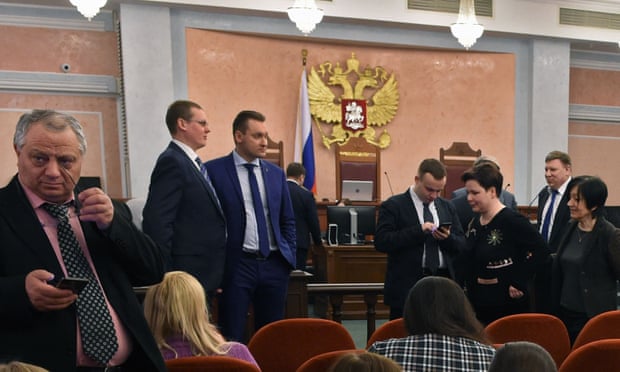Russia’s supreme court has banned the Jehovah’s Witnesses from operating in the country, accepting a request from the justice ministry that the religious organization be considered an extremist group.
The court ordered the closure of the group’s Russia headquarters and its 395 local chapters, as well as the seizure of its property.
The Interfax news agency on Thursday quoted justice ministry attorney Svetlana Borisova in court as saying that the Jehovah’s Witnesses “pose a threat to the rights of the citizens, public order and public security”.
Borisova also said Jehovah’s Witnesses’ opposition to blood transfusions violates Russian healthcare laws.
Yaroslav Sivulsky, a spokesman for Jehovah’s Witnesses in Russia, said in a statement they are “greatly disappointed by this development and deeply concerned about how this will affect our religious activity”.
Jehovah’s Witnesses said they would appeal against the ruling.
The Jehovah’s Witnesses claim more than 170,000 adherents in Russia. The group has come under increasing pressure over the past year.
Russian authorities have put several of the group’s publications on a list of banned extremist literature, and prosecutors have long cast it as an organisation that destroys families, fosters hatred and threatens lives, a description the organisation says is false.
Human Rights Watch criticised Thursday’s decision as an impediment to religious freedom in Russia.
“The supreme court’s ruling to shut down the Jehovah’s Witnesses in Russia is a terrible blow to freedom of religion and association in Russia,” said Rachel Denber, deputy Europe and Central Asia director at Human Rights Watch.
The rights group also expressed concern that if the ruling takes effect, Jehovah’s Witnesses could face criminal prosecution and punishment ranging from fines to prison time.
Original Article
Source: theguardian.com
Author: Staff and agencies in Moscow
The court ordered the closure of the group’s Russia headquarters and its 395 local chapters, as well as the seizure of its property.
The Interfax news agency on Thursday quoted justice ministry attorney Svetlana Borisova in court as saying that the Jehovah’s Witnesses “pose a threat to the rights of the citizens, public order and public security”.
Borisova also said Jehovah’s Witnesses’ opposition to blood transfusions violates Russian healthcare laws.
Yaroslav Sivulsky, a spokesman for Jehovah’s Witnesses in Russia, said in a statement they are “greatly disappointed by this development and deeply concerned about how this will affect our religious activity”.
Jehovah’s Witnesses said they would appeal against the ruling.
The Jehovah’s Witnesses claim more than 170,000 adherents in Russia. The group has come under increasing pressure over the past year.
Russian authorities have put several of the group’s publications on a list of banned extremist literature, and prosecutors have long cast it as an organisation that destroys families, fosters hatred and threatens lives, a description the organisation says is false.
Human Rights Watch criticised Thursday’s decision as an impediment to religious freedom in Russia.
“The supreme court’s ruling to shut down the Jehovah’s Witnesses in Russia is a terrible blow to freedom of religion and association in Russia,” said Rachel Denber, deputy Europe and Central Asia director at Human Rights Watch.
The rights group also expressed concern that if the ruling takes effect, Jehovah’s Witnesses could face criminal prosecution and punishment ranging from fines to prison time.
Original Article
Source: theguardian.com
Author: Staff and agencies in Moscow

No comments:
Post a Comment